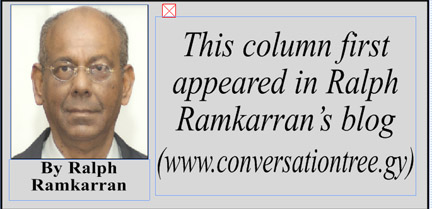October 1953
The first election under universal adult suffrage was held in British Guiana on April 27, 1953. It was won by the Peoples’ Progressive Party which had been formed in 1950 during an era of anti-colonial upsurge in the British Empire, particularly in South Africa, Malaya and Kenya. Cheddi Jagan had expressed solidarity with the anti-colonial struggles in these countries in his speech at the opening of the Legislative Assembly on June 17, 1953. Many at that time, and for the rest of his political career, would have preferred that he remain silent about the foreign domination and oppressed.

The leaders of 1953 were all young men and women who had either formed the PPP in 1950 or joined it shortly after. But they already knew, because the social and cultural history of British Guiana had already taught them, that only a national movement consisting of ethnic and class unity would bring success in the struggle for independence and social justice. The 1953 movement represented that ideal and achieved it for a short while. The united PPP was the first political party which mobilised working people to struggle in unity for their freedom.
For reasons that are well known, the unity did not last, and the division led inevitably to severe ethno-political discord thereafter. The political divisions and discord which were a direct consequence of the suspension in 1953 has created a permanent scar of ethno-political instability which has dominated political debate since then. Shortly after the split in the PPP in 1955, voices began to be heard, and efforts began to be made to retrieve some sort of political unity. Most were aware then, and it has been proven by events since, that Guyana will not realise its full potential until the ethno-political division is moderated, which is possible without there being any losers. Unless this happens, our oil wealth will become a political football.
October 1992
On October 5, 1992, free and fair elections were restored to Guyana after 24 years of hard political struggle. Many suffered, some lost their lives and the country has yet to recover. But 1992 restored a semblance of democratic norms and allowed Guyana to resume its respectability among the community of nations as a country where the will of the people is respected. The years since then have proved beyond any doubt that progress can only be made in Guyana if democracy is sustained and nurtured. They have also proved that although it takes time, and will take some more, ethno-political domination will not always win out. PNC supporters expressed their disapproval of their party in 2006 with significant numbers supporting the AFC. Supporters of the PPP expressed their disapproval of their party in 2011, and to a lesser extent in 2015, with significant numbers supporting the AFC. The PNCR proved in 2015 that a creative coalition in the right political conditions can negate ethno-political rigidities. Only a democratic culture will permit such new formations and encourage innovative debate.
October 1992 was not possible without the active and passive support of the majority of the Guyanese people, in and out of Guyana, together with international solidarity. The PPP struggled alone from 1968 to 1973. In 1975 the WPA energised the struggle and mobilized and inspired additional forces. Trade union unity, especially between bauxite and sugar workers became a major factor. Towards the end of the 1970s civil society groups became vocal and in the fight against the 1978 referendum, organizational unity in civil society and among political groups made an enormous impact on the struggle against authoritarian rule. It was so severely wounded that it never recovered.
There is no doubt that the end of the Cold War played an important role in dismantling the narrative that kept in place the West’s rationale for supporting rigged elections and keeping the PPP out of office. But Guyanese at home and abroad were well aware that only hard, continuous and unrelenting efforts and national and international pressure would end authoritarian rule. It was not going to be a gift from the West and the PNC was not going to give up power unless forced to do so.
The lesson of October 1992 is that Guyana must never allow the return of authoritarian rule. Many argue that Hoyte made a mistake by conceding free and fair elections. Others whisper that ‘we must never allow what happened in October 1992 to happen again.’ We must stand guard at the gates of freedom to ensure that such forces do not gain entry.






